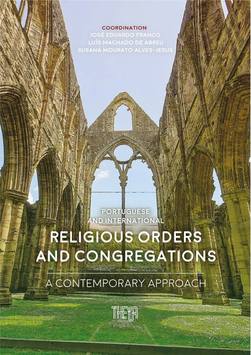
A Contemporary Approach
Coordenadores: Luís Machado de Abreu, Susana Mourato Alves-Jesus e José Eduardo Franco
Data de publicação: 2018
Comprar Ebook
Sinopse:
The history of the religious Orders coincides with almost half the history of Portugal and a significant part of the history of Europe, representing a momentous presence and a significant influence in human history; especially since the globalization process initiated by the Portuguese and the Spanish maritime expeditions in the early modern age. This volume bring together a number of qualified studies presenting a multifaceted history of the Orders: theology, spirituality, evangelization, catechesis, liturgy, politics, education, art, solidarity, culture, political controversy, social communication, etc. Experts and researchers from different countries and disciplines present here their ground-breaking and comprehensive work on the religious Orders and Congregations, allowing us to better know and understand the formation, institutionalization and extraordinary influence of these institutions through the centuries and in different parts of the globe.
Conteúdos::
Presentation (José Eduardo Franco)
Introduction (Luís Machado de Abreu)
Church and State in Portugal: Cooperation and Dissention Between Two States: A Political State and a Religious State (Church) (José Eduardo Franco)
The Religious Orders in England: Dissolution, Exile and Restoration in a Protestant State (William Sheils)
The Hand of God and the Arm of Power in then History of the Orders and Congregations (Luís Machado de Abreu)
Monastic Architecture and Territory: An Overview of the Location Strategies Used by the Religious Communities in Portugal (Catarina Almeida Marado)
Criticism of the Religious Orders in the Age of Enlightenment: The Portuguese Influence on European Thought (Christine Vogel)
Literatures and the Monastic Orders: Memory and Legitimation (Annabela Rita)
The Rule of the Benedictines: Seeking God / Serving the Brothers in the Community (Geraldo J. Amadeu Coelho Dias, OSB)
The Cistercians of Alcobaça and thenDevelopment of the Medieval Portuguese Literary Prose (Aida Sampaio Lemos)
Cistercians in Portugal: From Order to Congregation According to an Architectural Perspective (Ana Maria Tavares Martins)
The Portuguese Contribution to the Cistercian Hymnal (Mara Fortu de Araújo)
Isabel of Aragon and the Cistercian Order in Portugal (Giulia Rossi Vairo)
Modern project of Jesuits’ religious globalization: The College of Bahia in Colonial Brazil (Fernanda Santos)
The Evangelical Militancy of the Jesuits From East to West in the 16th century (António Manuel de Andrade Moniz)
The Ratio Studiorum of the Society of Jesus - A New International Educational Style (MargaridanMiranda)
Jesuit Humanism and its Influence on Early Modern Polish Cultural Identity (Andrzej Borowski) The Jesuits and the sacral legitimation of the House of Braganza - The Elogium Triumphale (1647) of Fr. Francisco Machado SJ: a case study (Carlota Miranda Urbano)
Jesuit Interiors in Portugal at the time of the Suppression: Excerpts for the reconstruction of daily life (Maria Cristina Osswald)
Religious Architecture in Colonial Brazil: Sharing Knowledge and Emotions (Paulo de Assunção)
Congregations and orders in Brazil: The beginnings of a map (Paula Leonardi and Agueda B. Bittencourt)
Religious Congregations and Secondary School in Brazil in the Period Between the Constitution of the Republic and the Sixties (Norberto Dallabrida)
Religious Orders and Teaching of Philosophy in Brazil (Celso João Carminati)
The 16th and 17th-Centuries Female Convents in the Iberian Peninsula and in the Polish-Lithuanian Community and the Paradox of Women’s Freedom (Joanna Partyka)
From the 1st Polish Republic to D. José I’s Monarchy: Father Casimir of St. Joseph Wyszynski (1700-1755) and the Founding of the Polish Marian Order in Portugal (Justyna Galinska) Lisbon’s Processions and Festivities Reinvented by the Society of Jesus at the Time of the Habsburgs (Maria João Pereira Coutinho and Sílvia Ferreira)
Friars in Health Care: from the Ancient Régimento the First Republic (Aires Gameiro)
Religion and Politics: The Faces of the Congregational Controversy. The ‘Trinas case’ (1891) (Maria de Fátima Reis)
Religious Orders and Congregations vs. the Republican Law in Portugal (António de Araújo)
Causes of Canonization of Portuguese Religious Men and Women (Manuel Saturino Gomes)
Coordenadores: Luís Machado de Abreu, Susana Mourato Alves-Jesus e José Eduardo Franco
Data de publicação: 2018
Comprar Ebook
Sinopse:
The history of the religious Orders coincides with almost half the history of Portugal and a significant part of the history of Europe, representing a momentous presence and a significant influence in human history; especially since the globalization process initiated by the Portuguese and the Spanish maritime expeditions in the early modern age. This volume bring together a number of qualified studies presenting a multifaceted history of the Orders: theology, spirituality, evangelization, catechesis, liturgy, politics, education, art, solidarity, culture, political controversy, social communication, etc. Experts and researchers from different countries and disciplines present here their ground-breaking and comprehensive work on the religious Orders and Congregations, allowing us to better know and understand the formation, institutionalization and extraordinary influence of these institutions through the centuries and in different parts of the globe.
Conteúdos::
Presentation (José Eduardo Franco)
Introduction (Luís Machado de Abreu)
Church and State in Portugal: Cooperation and Dissention Between Two States: A Political State and a Religious State (Church) (José Eduardo Franco)
The Religious Orders in England: Dissolution, Exile and Restoration in a Protestant State (William Sheils)
The Hand of God and the Arm of Power in then History of the Orders and Congregations (Luís Machado de Abreu)
Monastic Architecture and Territory: An Overview of the Location Strategies Used by the Religious Communities in Portugal (Catarina Almeida Marado)
Criticism of the Religious Orders in the Age of Enlightenment: The Portuguese Influence on European Thought (Christine Vogel)
Literatures and the Monastic Orders: Memory and Legitimation (Annabela Rita)
The Rule of the Benedictines: Seeking God / Serving the Brothers in the Community (Geraldo J. Amadeu Coelho Dias, OSB)
The Cistercians of Alcobaça and thenDevelopment of the Medieval Portuguese Literary Prose (Aida Sampaio Lemos)
Cistercians in Portugal: From Order to Congregation According to an Architectural Perspective (Ana Maria Tavares Martins)
The Portuguese Contribution to the Cistercian Hymnal (Mara Fortu de Araújo)
Isabel of Aragon and the Cistercian Order in Portugal (Giulia Rossi Vairo)
Modern project of Jesuits’ religious globalization: The College of Bahia in Colonial Brazil (Fernanda Santos)
The Evangelical Militancy of the Jesuits From East to West in the 16th century (António Manuel de Andrade Moniz)
The Ratio Studiorum of the Society of Jesus - A New International Educational Style (MargaridanMiranda)
Jesuit Humanism and its Influence on Early Modern Polish Cultural Identity (Andrzej Borowski) The Jesuits and the sacral legitimation of the House of Braganza - The Elogium Triumphale (1647) of Fr. Francisco Machado SJ: a case study (Carlota Miranda Urbano)
Jesuit Interiors in Portugal at the time of the Suppression: Excerpts for the reconstruction of daily life (Maria Cristina Osswald)
Religious Architecture in Colonial Brazil: Sharing Knowledge and Emotions (Paulo de Assunção)
Congregations and orders in Brazil: The beginnings of a map (Paula Leonardi and Agueda B. Bittencourt)
Religious Congregations and Secondary School in Brazil in the Period Between the Constitution of the Republic and the Sixties (Norberto Dallabrida)
Religious Orders and Teaching of Philosophy in Brazil (Celso João Carminati)
The 16th and 17th-Centuries Female Convents in the Iberian Peninsula and in the Polish-Lithuanian Community and the Paradox of Women’s Freedom (Joanna Partyka)
From the 1st Polish Republic to D. José I’s Monarchy: Father Casimir of St. Joseph Wyszynski (1700-1755) and the Founding of the Polish Marian Order in Portugal (Justyna Galinska) Lisbon’s Processions and Festivities Reinvented by the Society of Jesus at the Time of the Habsburgs (Maria João Pereira Coutinho and Sílvia Ferreira)
Friars in Health Care: from the Ancient Régimento the First Republic (Aires Gameiro)
Religion and Politics: The Faces of the Congregational Controversy. The ‘Trinas case’ (1891) (Maria de Fátima Reis)
Religious Orders and Congregations vs. the Republican Law in Portugal (António de Araújo)
Causes of Canonization of Portuguese Religious Men and Women (Manuel Saturino Gomes)

